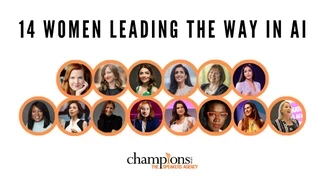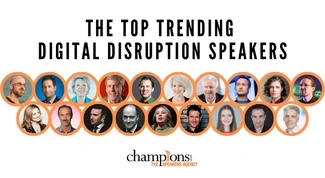For most people, the thought of globally implemented artificial intelligence (AI) sounds like the plot of a Hollywood blockbuster. However, as technology continues to advance, so too does the development of AI. Business leaders and computer scientists alike are pioneering artificial intelligence, mass-producing products and services to make the revolutionary technology accessible to the masses.
Check out our list of the top AI advancements in the 21st, and the experts who have made them possible.
What is artificial intelligence?
At its core, artificial intelligence is an ever-evolving sector of computer science that focuses on smart technology, machines that can perform tasks that would otherwise require human intelligence or intuition.
It has garnered both criticism and praise, with some warning that AI robotics may leave many manual workers jobless, while others suggest that it can revolutionise healthcare. Regardless, AI is not just here to stay, but on a trajectory to becoming more integrated into our lives than we could ever have imagined.
AI is by no means a new concept, as the very first recognisable venture into the world of AI can be traced back to 1943, when scientists McCulloch and Pitts had the idea to create “artificial neurons”. With 2021 just around the corner, McCulloch and Pitts’ “artificial neurons” may soon be more than just an idea, but a tangible part of our everyday lives.
Autonomous Cars: 2009 & 2015
One key area of artificial intelligence is self-driving cars. In 2009, Google built the first self-driving car and they, alongside sustainable automotive market leaders Tesla, are leading the way in revolutionising how we drive. In 2015, Tesla released brand new software that included autopilot capability, a landmark feat of the automobile industry.
Originally focusing on parking assist, Tesla’s founder Elon Musk once claimed that by 2018 self-driving cars will be the norm on roads all over the world. He even predicted that drivers would be able to sleep in their cars, as their vehicles would avoid potential dangers with artificial intelligence.
However, with 2021 just around the corner, widely accessible self-driving cars are still a figment of Science Fiction novels, with the price of purchasing an autonomous vehicle being more than the average family can afford. If manufacturers can lower the cost of production, self-driving cars could be the next big thing.
Human Motion Capture Technology: 2010
It can be argued that video gaming has always had an element of AI when you consider how players often compete against computers during gameplay. In 2010, Xbox went one step further, when they released their new Kinect function.
An award-winning development, Kinect allowed people to play games without the need for a controller. Using a 3D camera and infra-red technology, Kinect became the first-ever video game to use human motion capture technology.
However, ten years on, the Kinect is nowhere to be seen. Many report that the technology was not reliable enough for the product to be a true success, and with few compatible videogames available to purchase, the novelty wore off within a matter of years. Now, Microsoft has removed the Kinect port from its newest Xbox models.
What can this teach us about AI? Well, in theory, the Kinect was supposed to revolutionise how we game, but in practice, it simply did not work. Artificial intelligence must first and foremost be usable and accessible, as well as innovative.
Personal Assistants: 2011, 2014 & 2016
10 years ago, the basic tasks your mobile phone could perform included calls, text and, at a push, internet browsing. Now that has all changed. In 2011, Apple developed Siri, a personal assistant tool for users to communicate with, ask questions and give instructions to.
Amazon later changed the game in 2014 when it produced the Alexa, an affordable speech recognition device that sits in your home, and inspired the Google Assistant.
What if you are interested in a personal assistant with a little more humanness? Hanson Robotics created Sophia the Robot in 2016, a landmark achievement in the field of robotics. As the most advanced human-like robot, she can hold conversations with people, walk and even draw.
Though some are concerned about this advancement, Sophia's creation marks the start of commercial human synthetics, who could one day become a staple of our everyday lives.
Board Game Beating Robots: 2015
The benefits of AI are seemingly endless, but so too are the potential pitfalls. Some of the world’s biggest films have showcased a world where robots defeated humans, sparking the imagination of AI optimists, pessimists and general audiences. While this, at least for now, is not a possibility, AI has shown that it is capable of beating the human brain in other ways.
The board game Go is popular in Korean culture, famed for its complexity. The perfect game to test AI’s potential, Google developed their computer programme titled AlphaGo, to successfully play Go. In 2015, the program beat Go champion Fan Hui 5-0, showing just how far technology has come in recent years.
Similar programs have also been developed, which have defeated international poker players. With the ability to improve by playing itself, this type of AI has the potential to overtake human intelligence.
Cambridge Analytica Scandal: 2018
It is easy to list the benefits of artificial intelligence, but what if could be used for malicious gain? Well, it already has. In 2018, the Cambridge Analytica scandal was unearthed by Chris Wylie in a series of interviews for The Observer.
The revelation highlighted how Cambridge Analytica and Facebook used artificial intelligence to collect people’s data and exploit it for political and commercial gain.
This is a prime example of how artificial intelligence can be used for evil, just as much as it can be used for good. Chris Wylie, who drew valuable attention to the mishandling of data, now educates corporations on the policies and guidelines that they must abide by, to ensure the protection of people’s data.
As a consultant and public speaker, his influence has the power to set companies on the ethical side of the corporate tracks.
AI Gamers vs Humans: 2019
In 2019, a team of AI became the first of its kind to beat a human team of gamers at the Dota 2 World Championships. Though many have succumbed to the knowledge that AI is quicker, even smarter, than humankind, their ability to work as a team amazed computer scientists across the globe.
For the eSports community, the achievement marks a shift in the industry – is AI the new gamer?
eSports stars have exploded in popularity in recent years, garnering thousands of fans through their exciting gameplay. For many, the magic of eSports is the personalities, the conflicts and friendships that develop throughout a Championship.
With this in mind, it is safe to say that the industry is safe from the AI takeover, but what the achievement does show is the evolving capabilities of artificial intelligence.
Want to find out more?
So much is up for discussion in this rapidly changing area, including the future of AI, current trends and how technology will play a part in everyday business. The best way to prepare your company for the impact of AI, including the ways that you can utilise such technology to streamline your processes, is by booking an artificial intelligence speaker.
These resident experts have dedicated their careers to AI, a reflection of their professional experience and academic knowledge – take a look at our Top 10 AI speakers to find the perfect specialist for your event.
Stay ahead of the curve, and call a booking agent on 0207 1010 553 or complete our online form.









